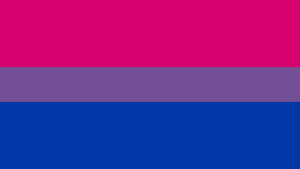Celebrating Bisexuality Day

Today is Celebrate Bisexuality Day. As as I considered it’s approach, and watched Bisexual Awareness Week articles pass through my social media feeds, I realized I hadn’t told my whole story. You can hear parts of in my my Mystery Box Show story, and I’ve referenced bits and pieces elsewhere, but it deserves compiling in one place.
I can’t remember a time before I was a sexual being. I was always exploring and seeking out information. Even in a sex positive household I realized some things were taboo without ever being told.
When my mom gave me the sex talk, at maybe 10 years old, it was very straightforward. The only question I asked was, “what happens if you have to pee?” Her reasonable answer was, “You excuse yourself and go.”
I considered what she’d told me, about the penis going in the vagina, and realized I must be missing something. I was imagining sex looked like scissoring, and that didn’t seem comfortable at all. I went back and asked her, complete with hand gestures, and she explained erections. The other burning question I had, what if it’s two women having sex? I couldn’t bring myself to ask.
There was no homophobia in my household. In fact, there was a gay couple in our inner family circle, present at all the big holidays, but some part of my young mind insisted that I shouldn’t speak that question aloud.
My mother passed away just before my 13th birthday, and with her also died my easy access to information. I moved in with my conservative and old fashioned paternal grandparents and began facing slut-shaming before I’d even begun to earn it.
I had attractions across the gender spectrum from the very beginning. There is evidence in my diary, from eight or nine years old, when I stated “I like boys that look like girls.” The gender bending I was referring to at the time was David Bowie in Labyrinth and Tim Curry in Rocky Horror. I stand by that preference— although these days I’d use less gendered language.
In high school I became a drama nerd. That community saved me from being a complete social outcast. We were strange, but we were strange together. And most of us were figuring out our sexuality.
You might not guess it if you only know my dress-and-lipstick-wearing self of today, but I was quite the tomboy or butch in my youth. I was regularly cast in (stereotypically) lesbian roles. I would raid my father’s closet each time — I wore his ties more often than he did. And although I was attracted to other girls, it wasn’t until my senior year that I got a chance to act on it. Even then it was a friend, and late night foolishness with an audience, and I managed to tell myself it didn’t count. I was waiting for an ah-ha moment, but the form it came in was not what I expected.
When I was 17, I met an older man who identified as bisexual. That changed everything. He gave me books, including Bi Any Other Name and I realized that this thing I’d been feeling all along was real. He also introduced me to the local bisexual community — small though it was — and I established friendships that I maintain to this day.
I even marched in the Long Beach Pride parade. It was the first year they allowed a bisexual contingent. Not everyone was happy to see us, but I walked front and center in our group and I couldn’t have been happier to be there.
Meanwhile, I was having discussions/arguments with people who claimed bisexuality didn’t exist. I encountered bi-phobia in both the straight and queer communities. I still feel elements of that to this day. But mostly I’m very lucky. I’ve been able to live my life being open about who I am. And I’m so grateful to my friends and my partners and my community.
There’s still a lot of work to be done. Bisexuality gets erased from the mainstream discourse on a regular basis and there’s still a lot of bi-phobia to fight both in and out of queer spaces. And there are more worrying facts, too:
“In addition to stereotypes and myths, and perhaps because of them, bisexual people suffer from high levels of violence, economic insecurity, poor health, and employment discrimination. For example, 61 percent of bisexual women say they have experienced rape, physical violence, and/or stalking by an intimate partner, compared to 43 percent of lesbians and 35 percent of straight women.” [Link]
And also,
“According to the San Francisco Human Rights Commission’s report on bisexual invisibility… bisexuals have a higher risk of suicide and poorer mental health than the general population. The report suggests there is a correlation between the lack of bisexual visibility and poor mental health among bisexuals.” [Link]
I’m in a fortunate position where I can be loud about my identity. So for all of these reasons and more, you’ll find me identifying as bisexual whenever I can.
And for anyone who is worried that the term enforces a gender binary, I give you this — my favorite video on the topic:
